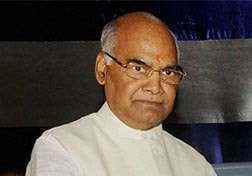
NEW DELHI - President Ram Nath Kovind on Sunday approved an ordinance to provide death penalty for those convicted of raping girls younger than 12 years besides clearing another ordinance to confiscate property of fugitive economic offenders. The President promulgated The Criminal Law (Amendment) Ordinance, 2018, approved by the Cabinet on Saturday that seeks to provide effective deterrence against rape and instil a sense of security...

among women, particularly young girls. The ordinance amends the Indian Penal Code, the Indian Evidence Act, the Code of Criminal Procedure and the Protection of Children from Sexual Offences Act.
The ordinance comes against the backdrop of the rape and murder of an eight-year-old girl in Kathua in Jammu and Kashmir, the rape of a teenager in Unnao in Uttar Pradesh and similar crimes in other parts of the country.
The development puts in place a number of measures for speedy investigation and trial of rape cases including a two-month time limit for investigation, two months for completion of trial and six months for disposal of appeals.
It provides that punishment for rape of a girl younger than 12 will be a minimum 20 years imprisonment or imprisonment for life or with death.
Punishment for gang rape of a girl under 16 years of age will invariably be imprisonment for rest of life. In case of gang rape of a girl below 12 years, punishment will be jail for life or death sentence.
The minimum punishment in case of rape of women has been increased from rigorous imprisonment of seven years to 10 years, extendable to life imprisonment. In case of rape of a girl aged below 16, minimum punishment has been increased from 10 to 20 years, extendable to imprisonment for rest of life -- meaning imprisonment till that person's natural life.
The ordinance also provides that the court has to give notice of 15 days to the Public Prosecutor and the representative of the victim before deciding bail applications in case of rape of a girl under 16 years of age.
There will be no provision for anticipatory bail for a person accused of rape or gang rape of a girl under 16 years.
It also aims at strengthening investigation and prosecution including setting up fast track courts and special forensic labs in each state besides maintaining a national database of sexual offenders. Kovind also promulgated The Fugitive Economic Offenders Ordinance, 2018, which followed the Punjab National Bank fraud case, in which the main accused, diamond trader Nirav Modi and his uncle Mehul Choksi, fled the country after duping banks to the tune of over Rs 30,000 crore.
The ordinance lays down the measures to empower Indian authorities to attach and confiscate proceeds of crime associated with economic offenders and the properties of the economic offenders and thereby deter economic offenders from evading the process of Indian law by remaining outside the jurisdiction of Indian courts. The Bill is expected to re-establish the Rule Of Law as economic offenders would be forced to return to India to face trial for scheduled offences.
This would also help the banks and other financial institutions to achieve higher recovery from financial defaults committed by such offenders and improve the financial health of such institutions.
The ordinance comes against the backdrop of the rape and murder of an eight-year-old girl in Kathua in Jammu and Kashmir, the rape of a teenager in Unnao in Uttar Pradesh and similar crimes in other parts of the country.
The development puts in place a number of measures for speedy investigation and trial of rape cases including a two-month time limit for investigation, two months for completion of trial and six months for disposal of appeals.
It provides that punishment for rape of a girl younger than 12 will be a minimum 20 years imprisonment or imprisonment for life or with death.
Punishment for gang rape of a girl under 16 years of age will invariably be imprisonment for rest of life. In case of gang rape of a girl below 12 years, punishment will be jail for life or death sentence.
The minimum punishment in case of rape of women has been increased from rigorous imprisonment of seven years to 10 years, extendable to life imprisonment. In case of rape of a girl aged below 16, minimum punishment has been increased from 10 to 20 years, extendable to imprisonment for rest of life -- meaning imprisonment till that person's natural life.
The ordinance also provides that the court has to give notice of 15 days to the Public Prosecutor and the representative of the victim before deciding bail applications in case of rape of a girl under 16 years of age.
There will be no provision for anticipatory bail for a person accused of rape or gang rape of a girl under 16 years.
It also aims at strengthening investigation and prosecution including setting up fast track courts and special forensic labs in each state besides maintaining a national database of sexual offenders. Kovind also promulgated The Fugitive Economic Offenders Ordinance, 2018, which followed the Punjab National Bank fraud case, in which the main accused, diamond trader Nirav Modi and his uncle Mehul Choksi, fled the country after duping banks to the tune of over Rs 30,000 crore.
The ordinance lays down the measures to empower Indian authorities to attach and confiscate proceeds of crime associated with economic offenders and the properties of the economic offenders and thereby deter economic offenders from evading the process of Indian law by remaining outside the jurisdiction of Indian courts. The Bill is expected to re-establish the Rule Of Law as economic offenders would be forced to return to India to face trial for scheduled offences.
This would also help the banks and other financial institutions to achieve higher recovery from financial defaults committed by such offenders and improve the financial health of such institutions.

 RSS Feed
RSS Feed
